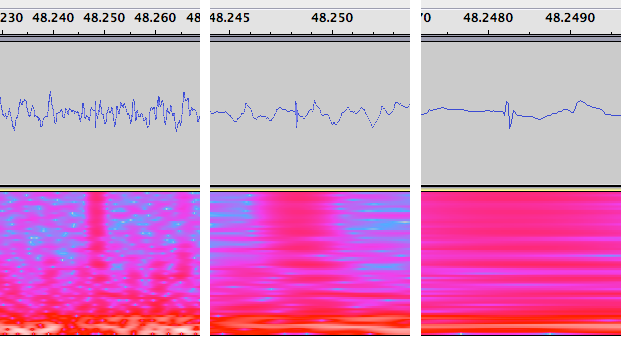Audacity Tip: Cleaning up Scratches
.figure {
display: block;
text-align: center;
}
.caption {
font-style: italic;
}
Just something I discovered recently while using Audacity to clean up some old vinyl recordings:
The Click Removal tool does a darn good job of cleaning up most scratches, but not all. IME it’s still necessary to go back after it to fix what it missed (I find that the Repair tool works well for small scratches).
Unfortunately, a lot of scratches are hard to see with the default waveform view: a scratch can have a small amplitude (smaller than the clean waveform around it); it’s annoying because it shows up as a short burst of white noise in the middle of a tune.

The black bars mark the location of an audible but invisible click.
However, white noise shows up as a vertical bar in spectrum view. So what I did was:
- Duplicate the track I’m cleaning up.
- Mute the copy.
- Switch the copy to spectrum view; leave the original in waveform view.
That way, you can zoom out and easily find scratches on the spectrum view. By the time you zoom in and the spectrum becomes too smeared out to be useful, you can see the scratch in the waveform view, so you can fix it.

In spectrum view, the scratch is clearly visible as a bar that goes all the way to the top.
The downside of this technique is that Audacity has to do lots of FFTs to show the spectrum. So you may want to use a fast machine for this.

As we zoom in, the spectrum becomes too smeared out to be useful, but in waveform view, the scratch becomes obvious.
The other downside, of course, is that since you can see a lot more flaws, it takes ten times longer to fix a track.